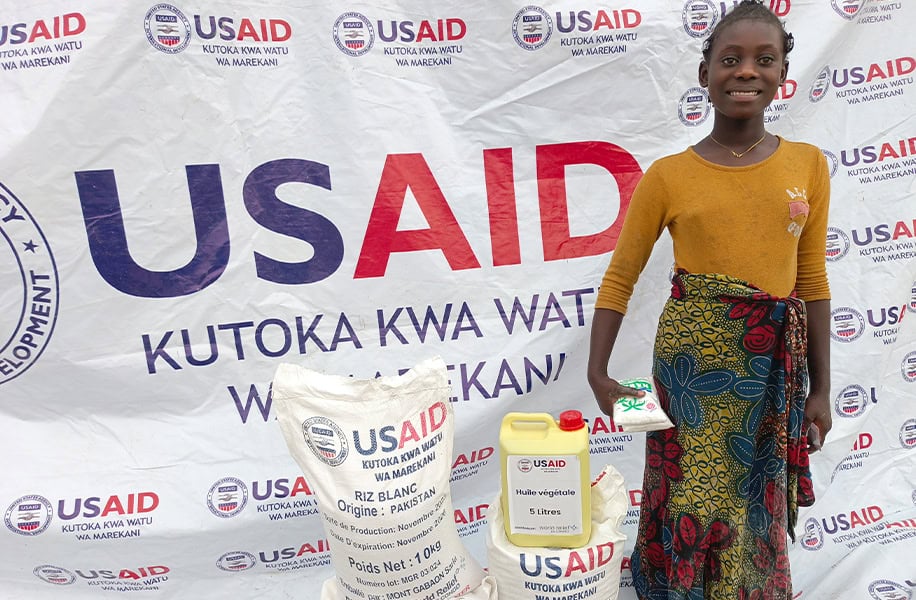Displacement in DR Congo: What’s happening and how you can help
|
Getting your Trinity Audio player ready...
|
“Surviving bombs, witnessing my parents’ death, and becoming a displaced minor orphan responsible for four people with no means of survival is a daily struggle.” — Sitia
Young girls like Sitia face terrifying circumstances just about every day in the Democratic Republic of Congo.
DR Congo has been a country in crisis for more than two decades. Despite being home to one of the largest reserves of potential wealth, with 200 million acres of cultivable land and large reserves of gold, diamonds, copper, zinc, coltan and cobalt, DR Congo is among the world’s poorest countries. Currently, 75% of the population live below the poverty line.
A history marked by the slave trade, colonialism and exploitation has led to deep inequities and almost continuous fighting among more than 100 warring factions since 1998. Deadly clashes between rival militias, political instability, local inter-communal tensions, land disputes and natural disasters all contribute to the volatility that has created a massive internal displacement crisis.
Help families like Sitia’s in DR Congo.
Millions of Congolese are Internally Displaced
At least seven million Congolese are currently internally displaced. In 2024 alone, 10% of the population has been forced to abandon their homes. Over 1.1 million Congolese are also seeking safety abroad, primarily in Uganda, Burundi, Rwanda, Zambia and Tanzania. World Relief has assisted over 4,000 Congolese refugees resettling in the United States in the last five years alone.
Like so many others, Sitia’s family was forced to flee their home in North Kivu province in 2022 when the March 23 Movement, known as M23, overran the mineral-rich area at the border with Rwanda.
Sadly, her parents and baby brother were killed by a bomb as they attempted to escape, leaving Sitia, then 13, as the sole caregiver for two younger brothers and two younger sisters. Today she’s caring for these four siblings in an Internally Displaced Persons (IDP) camp in Goma in the eastern region of DR Congo.
Women and Children are the Most Vulnerable
The impact of displacement in DR Congo is devastating, especially on women, children and the elderly. In addition to psychological trauma, families are losing their property and their ability to provide even the most basic essentials like food and water. Nearly a quarter of the population is experiencing severe food insecurity. Many families also become separated when violence breaks out.
Access to healthcare and education is also limited. Children who have dropped out of school are now exposed to even more risk including being recruited by armed groups or forced into child labor. 14.9 million children are in need of humanitarian assistance.
Gender-based violence, exploitation and abuse are rampant. Tens of thousands of girls and women are victimized annually, but because of the shame associated with gender-based violence, it’s almost impossible to count how many have truly been harmed.
Victims of sexual violence not only suffer physically; they are stigmatized and cast out of their families and communities. Some become homeless and because they are often considered subhuman, they are unable to provide for themselves or their children, many of whom have been conceived through rape.
How World Relief is Responding to the Displacement Crisis in DR Congo
World Relief has been responding to humanitarian crises in DRC since 2001. Working in close partnership with local churches, we have been walking alongside communities through agricultural and food assistance, child development and protection programing, healthcare, nutritional support, sanitation and hygiene projects, support for those impacted by sexual and gender-based violence and more.
Today, in spite of increasingly volatile conditions, we remain committed to the people of DR Congo and to finding solutions for the current displacement crisis and for families like Sitia’s.
Delivering Food Assistance
With funding from USAID’s Bureau for Humanitarian Assistance (BHA), we successfully completed Phase 1 of our emergency assistance program in North Kivu, providing vital food and non-food items to 4,179 households in Mudja and Don Bosco IDP camps. We are now implementing Phase 2, reaching 5,800 households with critical food assistance, including:
- Corn flour
- Beans
- White rice
- Vegetable oil
- Salt
This multi-phase program aims to alleviate hunger, support dignity, and promote resilience among displaced communities in Goma/North Kivu.
Sitia and her siblings, who live in Don Bosco IDP camp, are among the recipients. They’d gone without food for three months before World Relief began the program in partnership with USAID. One of her younger brothers even left the camp in a desperate attempt to find food, joining an estimated 30,000 children living on the streets of Goma.

Once the food distribution program began, Sitia’s brother reunited with the family.
“Thanks to [World Relief] and USAID, my younger brother has returned, and my siblings no longer need to steal food. We now have sufficient food, and our food security improves daily. [World Relief] and USAID’s food aid has renewed our hope and alleviated our suffering.” — Sitia
Growing a Brighter Future Through Agriculture
As a partner to USAID’s Bureau of Humanitarian Assistance, World Relief is also administering the Community Recovery Response Project, providing food and agriculture assistance, including tools and training, to 22,941 households impacted by displacement across eight health zones in Kongolo, a territory of Tanganyika Province.
Addressing Health and Wellness
With limited access to clean water, toilets, and healthcare in the IDP camps, there is a high risk of major outbreaks of infectious diseases such as cholera, measles, mpox and COVID which can spread quickly in such crowded conditions. Children and the elderly are at especially high risk of mortality from the spread of disease in IDP camps.
World Relief is currently providing critical food assistance to vulnerable individuals in IDP camps, as well as actively seeking opportunities to launch a comprehensive water, sanitation and hygiene (WASH) project to protect those seeking refuge in camps for the spread of disease.
Ensuring Holistic Healing for Victims of Violence
Through the SGBV (Sexual and Gender-Based Violence) Prevention and Response program, World Relief is walking alongside hundreds of victims of sexual and gender-based violence residing in IDP camps across Goma. This programming includes a comprehensive range of services, including:
- Confidential counseling and psychosocial support
- Medical care and referrals
- Legal assistance and advocacy
- Economic empowerment and livelihood training
- Community awareness and sensitization programs to prevent future violence
Through this holistic approach, World Relief aims to provide survivors with the necessary support to heal, rebuild their lives, and reclaim their dignity.
How You Can Help
Internal displacement in DR Congo is a complex, chronic issue that requires sustained attention and innovative solutions. The scale and intractability of the crises fueling displacement can be dangerous and overwhelming, and some aid agencies have withdrawn from the region for these very reasons.
At World Relief, however, we believe that God has not forgotten the people of DR Congo, and we remain committed to engaging this urgent crisis and seeking a flourishing future alongside our longstanding friends and partners in DR Congo. Despite facing unimaginable challenges, the Congolese people continue to show resilience and strength, inspiring our faith and motivating our action.
We see glimmers of hope in stories like Sitia’s, but we are still far from the thriving future we dream of for her and millions more who have been displaced from their homes in DR Congo.
Solutions aren’t easy — they will require trusted partnerships between people like you and local churches and community leaders committed to creating change on the ground in their own communities. And they require deep faith that believes all things are possible through Christ, the one who redeems our most broken places and brings beauty from ashes.
Will you join the critical work we’re doing in DR Congo and ensure humanitarian aid reaches those who need it, like Sitia, today?
Becoming a monthly donor is one of the best ways to help in places like DR Congo, where sustained commitment and generosity are needed to create change in the face of complex crises. Please consider becoming a monthly donor today.

Bienfait Amani is the IT and Communications officer at World Relief DR Congo. He uses his expertise to facilitate collaboration between teams and collect powerful stories from communities impacted by World Relief’s projects. His dedication sheds light on the resilience and hope of individuals in the face of adversity.

Susan Solomon Yem is an internationally published storyteller. She frequently writes about the refugee experience and her own work in refugee resettlement with World Relief where she also previously served as the New England regional representative.


